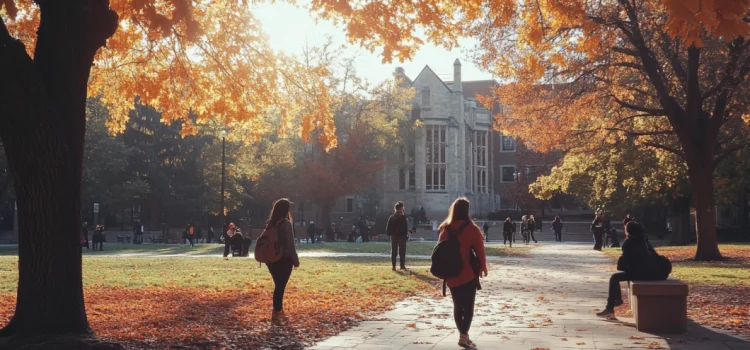
This is a free excerpt from one of Shortform’s Articles. We give you all the important information you need to know about current events and more.
Don't miss out on the whole story. Sign up for a free trial here .
Why are so many small colleges shutting down in the US? How do these closures affect students and communities?
Small colleges are rapidly disappearing across the US, with more than 500 private nonprofit institutions closing since 2014, and one closing every week in 2024. Many students whose colleges close never complete their degree—college closures also upend local economies.
Keep reading to learn why small colleges are closing in the US and why it’s such a big deal.
Small Colleges Are in Trouble
The pace of US colleges that are shutting down has intensified dramatically over the past decade. More than 500 private nonprofit colleges have shuttered since 2014—triple the number that closed in the previous 10 years.
Since March 2020 alone, more than 70 public and nonprofit colleges have shuttered or merged, with 40 of these schools closing completely rather than consolidating. The trend shows no signs of slowing—at least nine colleges across eight states have already announced they’ll halt operations in 2025, which will eliminate an estimated 2,300 jobs and cause $307 million in economic losses to local communities.
Why Small Colleges Are Closing
A combination of demographic shifts, financial pressures, and changing attitudes toward higher education is driving the trend:
- Demographic decline. Private liberal arts institutions have seen enrollment steadily decreasing since its peak in the early 2000s, as fewer college-age students enter the pipeline.
- Tuition dependence. Smaller schools depend heavily on tuition income, making them vulnerable to enrollment fluctuations.
- Financial barriers. Annual expenses at private colleges now approach $56,000, while technical problems with federal financial aid applications have further limited students’ ability to afford college. This has pushed many toward less expensive public schools or alternative paths.
- Value questions. While most Americans believe college is valuable, just 49% think the economic benefits justify the costs. As a result, many potential students are postponing attendance or seeking immediate employment.
- Covid aftermath. Pandemic disruptions initially reduced college enrollment, while the end of federal Covid relief funding has increased challenges for financially stressed institutions.
| Is a College Degree Necessary Anymore? The shift away from college degree workplace requirements is gaining traction across the US: – Eight states no longer require a college degree for many state government jobs. – Apple, Google, Tesla, and IBM don’t require a four-year bachelor’s degree. – President Joe Biden has emphasized the importance of apprenticeships. In 2022, he launched the Infrastructure Talent Pipeline Challenge to: Increase students’ access to career and technology training programs, apprenticeships, and programs that enable them to take college classes for credit. Give students skills needed for jobs available through the Biden Administration’s CHIPS and Science Act. |
College Closure Impacts
When colleges close, the effects ripple through both student populations and local communities.
- Student displacement. Private nonprofit college closures have affected roughly 46,000 students since 2020. Seven in 10 students were given neither a warning of the impending shuttering nor help with transition plans, making it harder to transfer or complete their degree. More than half of students impacted by closures never re-enrolled in another program.
- Transfer challenges. Students who transfer to other schools typically lose 43% of their previously earned credits, requiring more time and money to graduate.
- Degree verification. Graduates of colleges that shutter face ongoing challenges proving their credentials to employers, as there’s often no institution left to verify their degrees.
- Economic impact. Since 2022, the closure of 27 small liberal arts colleges nationwide has led to the loss of nearly 7,200 jobs and $374 million in labor income, with half these losses occurring in 2024 alone.
Higher Education’s Changing Landscape
The wave of college closures is also fundamentally reshaping American higher education.
- Program elimination. To survive, many colleges are eliminating majors and programs, particularly in the humanities.
- Access barriers. Elite universities are becoming increasingly stratified by wealth, as children of the top 1% gain admission at more than double the rate of academically similar middle-income peers.
- Degree completion. When institutions cease operations, they add to the 40 million Americans who aren’t able to complete their degrees because their colleges closed. Vulnerable populations are most impacted, as these shuttered schools typically serve higher proportions of students of color, women, and Pell Grant recipients.
- Small-business decline. College closures harm surrounding businesses like cafes, bookstores, and rental properties that depend on campus activity, creating devastating long-term economic impacts on small towns.
Looking Ahead
Experts emphasize that early intervention is crucial for preventing the most damaging effects of college closures. Colleges showing financial strain should explore merger possibilities before their situation becomes dire, since mounting debt makes them less attractive partners for stronger institutions. For schools that must close, providing advance notice and structured transition support is critical.
Meanwhile, regulators have stepped in. New federal rules require colleges to report financial red flags and maintain reserves to cover student loans if they close, putting student protection at the center of both prevention and closure processes.

Want to fast-track your learning? With Shortform, you’ll gain insights you won't find anywhere else .
Here's what you’ll get when you sign up for Shortform :
- Complicated ideas explained in simple and concise ways
- Smart analysis that connects what you’re reading to other key concepts
- Writing with zero fluff because we know how important your time is






